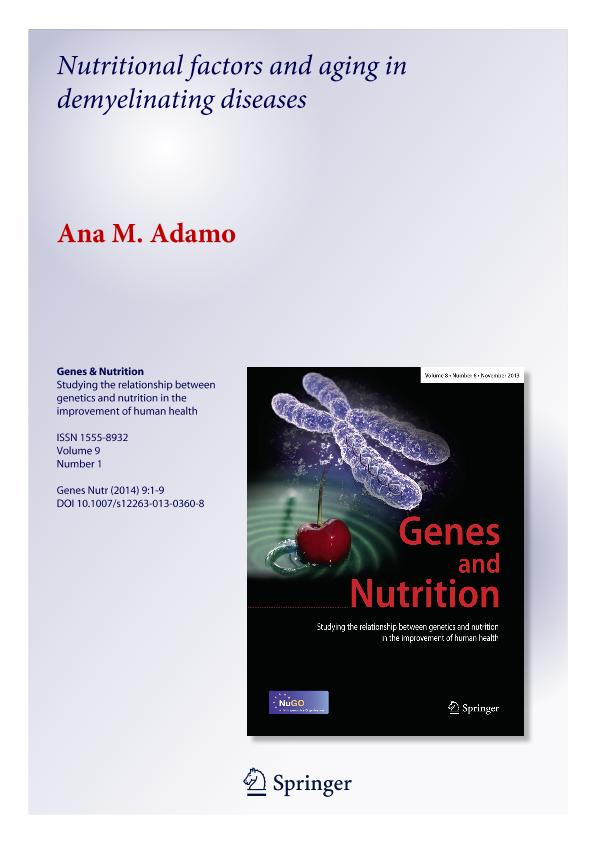Artículo
Nutritional factors and aging in demyelinating diseases
Fecha de publicación:
01/2014
Editorial:
Springer Verlag Berlín
Revista:
Genes and Nutrition
ISSN:
1555-8932
e-ISSN:
1865-3499
Idioma:
Inglés
Tipo de recurso:
Artículo publicado
Clasificación temática:
Resumen
Demyelination is a pathological process characterized by the loss of myelin around axons. In the central nervous system, oligodendroglial damage and demyelination are common pathological features characterizing white matter and neurodegenerative disorders. Remyelination is a regenerative process by which myelin sheaths are restored to demyelinated axons, resolving functional deficits. This process is often deficient in demyelinating diseases such as multiple sclerosis (MS), and the reasons for the failure of repair mechanisms remain unclear. The characterization of these mechanisms and the factors involved in the proliferation, recruitment, and differentiation of oligodendroglial progenitor cells is key in designing strategies to improve remyelination in demyelinating disorders. First, a very dynamic combination of different molecules such as growth factors, cytokines, chemokines, and different signaling pathways is tightly regulated during the remyelination process. Second, factors unrelated to this pathology, i.e., age and genetic background, may impact disease progression either positively or negatively, and in particular, age-related remyelination failure has been proven to involve oligodendroglial cells aging and their intrinsic capacities among other factors. Third, nutrients may either help or hinder disease progression. Experimental evidence supports the anti-inflammatory role of omega-6 and omega-3 polyunsaturated fatty acids through the competitive inhibition of arachidonic acid, whose metabolites participate in inflammation, and the reduction in T cell proliferation. In turn, vitamin D intake and synthesis have been associated with lower MS incidence levels, while vitamin D–gene interactions might be involved in the pathogenesis of MS. Finally, dietary polyphenols have been reported to mitigate demyelination by modulating the immune response.
Palabras clave:
Demyelination
,
Remyelination
,
Nutritional Factors
Archivos asociados
Licencia
Identificadores
Colecciones
Articulos(IQUIFIB)
Articulos de INST.DE QUIMICA Y FISICO-QUIMICA BIOLOGICAS "PROF. ALEJANDRO C. PALADINI"
Articulos de INST.DE QUIMICA Y FISICO-QUIMICA BIOLOGICAS "PROF. ALEJANDRO C. PALADINI"
Citación
Adamo, Ana María; Nutritional factors and aging in demyelinating diseases; Springer Verlag Berlín; Genes and Nutrition; 9; 360; 1-2014; 1-9
Compartir
Altmétricas




